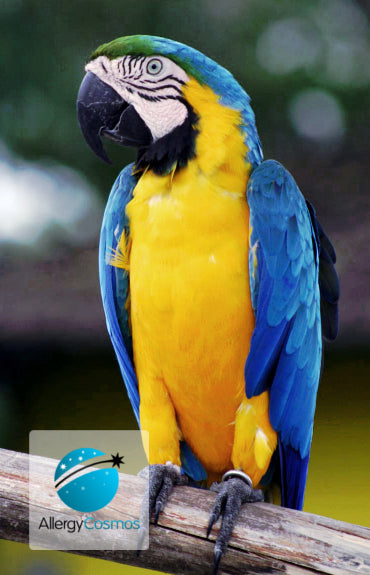Parrots are beautiful birds that can be great pets. However, they can seriously impair indoor air quality because, like most other pets (dogs and cats in particular), they produce parrot dander and thus cause pet allergies. All parrots give off parrot dander, also known as feather dust. This is produced from the feathers when they preen, or flap their wings. Most parrots have a preening gland at the back of the base of the tail. When a bird preens itself, secretions from this gland are spread over the feathers. For the bird, this is important for waterproofing the feathers and also has an antibacterial function. This dander is slightly sticky and hard to remove. In addition, some species of parrot also produce an additional type of feather dander that is called 'powder'. The so-called Powder Down Birds include cockatoos, cockatiels and African Greys. This kind of parrot dander comes from the specialised feathers these birds have, which shed a fine, waxy, white powder composed of keratin protein. If you stroke one of these birds, the powder will come off into your hand.
Parrot dander of both kinds can cause problems for their owners and for the birds themselves. Like dog and cat dander, it can trigger allergic reactions. In addition, it may cause a lung condition called allergic alveolitis (also known as budgerigar dander pneumoconiosis, bird breeder's disease, hypersensitivity pneumonitis and pigeon breeder's lung). The condition affects the air sacs of the lungs and is characterised by breathlessness and flu-like symptoms. It can become chronic and, in rare cases, cause permanent lung damage and even death.
The birds themselves may also be at risk from their own dander. That is because they do not have noses that can filter out dander particles. Exposure, if their surroundings are not kept clean, may affect their health and shorten their lifespan.
Fortunately, there are plenty of ways of protecting you, and your parrot, from the effects of parrot dander. The bird itself should be bathed often. Its cage should be cleaned very regularly and cage liners, which harbour the dander, changed often. If you are sensitive, wear a mask or try to get someone else to do these tasks. In preference, play with the bird just after it is bathed because dander levels will be lower. Pay attention to the rest of the home, because dander spreads around very readily. Wooden floors are preferable to a carpet, as the latter traps dander. The same is true of curtains, so consider replacing these with blinds if possible. Regular vacuuming with an allergy vacuum that is fitted with a high-efficiency particulate air (HEPA) filter will help to reduce the parrot dander level. A HEPA air purifier (such as the IQAir HealthPro 250) in the room where the bird lives will also help to reduce dander levels, so long as the filters are replaced regularly. This should help prolong the life of your pet. It may also be worth placing one in the bedroom of anyone who is allergic to parrot dander.
If you are considering buying a pet parrot and someone is allergic, bear in mind that all species of parrot – not just the Powder Down group – shed some dander. Parrots are not for everyone and it could be upsetting to have to find your bird a new home if, despite all the protective measures above, someone still suffers severe allergic symptoms in the presence of a parrot.




